Key takeaways:
- Poetry serves as a powerful tool for emotional expression and cultural reflection, encapsulating the values and struggles of societies.
- Engaging with poetry fosters empathy and understanding by bridging gaps between different experiences and perspectives.
- Personal experiences with poetry can lead to profound insights, vulnerability, and creative inspiration in one’s own writing.
- Sharing poetry encourages connection and dialogue, revealing the richness of diverse narratives and emotional experiences.

Understanding poetry and its forms
Poetry can often feel like a language of its own, full of nuances and rhythms that resonate on a deeper emotional level. I remember the first time I stumbled upon a villanelle; its intricate structure made me feel both challenged and exhilarated. How can a form so rigid convey such profound emotions? This contradiction is part of what makes poetry so captivating.
Exploring different forms of poetry has taught me that structure is not just a constraint but a powerful tool for expression. For instance, the sonnet, with its distinct rhyme scheme, forces me to distill emotions into a compact space. In my own writing, I’ve found that when I adhere to these structures, surprisingly, it can lead to bursts of creativity as I search for the perfect word to make my feelings known.
As I delve into free verse, I find myself liberated yet sometimes overwhelmed by the infinite possibilities. The absence of a fixed form allows for a raw and authentic representation of thought. Have you ever felt that freedom? In my experience, it invites an exploration of self and society in ways that traditional forms might not, providing a space where the heart speaks without boundaries.

Importance of poetry in culture
Poetry plays a vital role in shaping cultural identity and preserving history. Each poem is a snapshot of the time it was created, reflecting the values, struggles, and aspirations of a society. I recall reading poems from different cultures and feeling a connection to their past—how can mere words encapsulate an entire heritage?
Through poetry, we also foster empathy and understanding. When I read works from voices different from my own, it opens my eyes to experiences and perspectives I might never encounter otherwise. Isn’t it fascinating how a few lines can bridge gaps and encourage conversations about our shared humanity?
Moreover, poetry often serves as a catalyst for social change. I remember participating in slam poetry events where passionate performances echoed cries for justice. Isn’t it powerful how poetry can ignite movements and inspire action? The ability of poetry to challenge norms and provoke thought cements its importance in our cultural landscape.
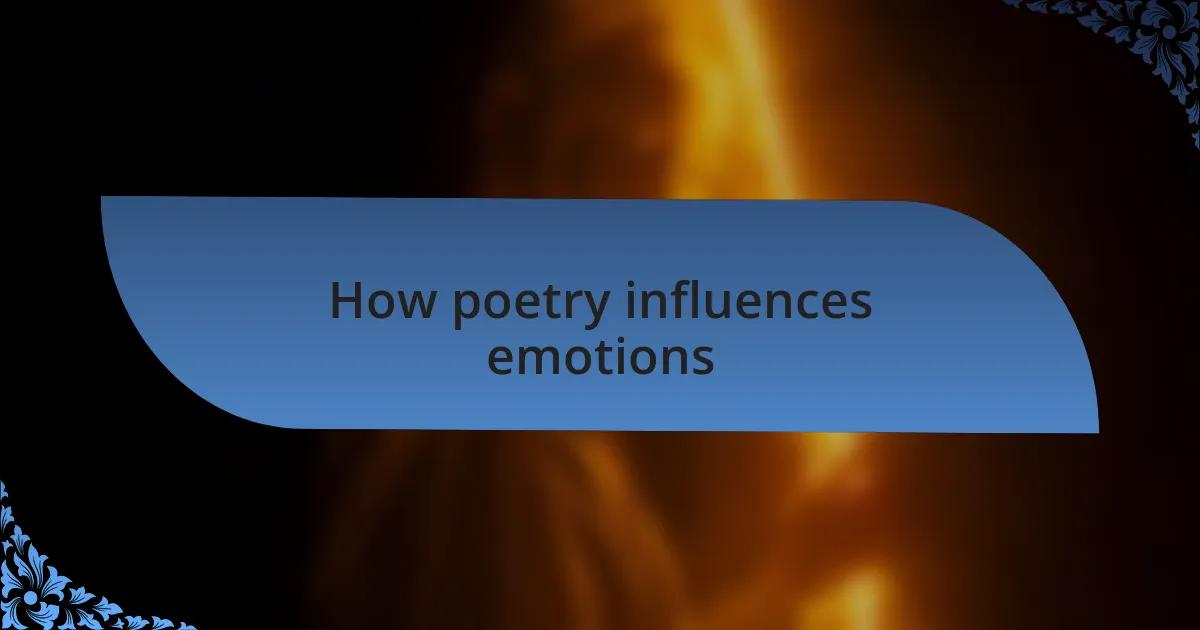
How poetry influences emotions
Poetry has a unique way of tapping into our deepest emotions, often reflecting feelings we didn’t even know we had. I remember reading a poem about loss that perfectly articulated my own grief; it was as if the poet had reached into my heart and written my feelings down. Have you ever felt that resonance when a piece of writing seems to speak directly to your experience?
When I dive into poetry, I feel a spectrum of emotions, from joy to melancholy, sometimes all in one piece. Just the other day, I read a poem about love that not only made my heart swell but also reminded me of the bittersweet moments in my own relationship. It’s incredible how words can conjure vivid memories and feelings that leave us reflecting on our lives.
Interestingly, poetry doesn’t just mirror emotions; it can also shape them. I often find myself journaling after experiencing a particularly moving poem, allowing my thoughts to flow freely. This process has made me realize that poems can act as emotional guides, helping us navigate complex feelings or encouraging us to embrace vulnerability. Isn’t it fascinating how a few stanzas can lead to such profound personal insights?
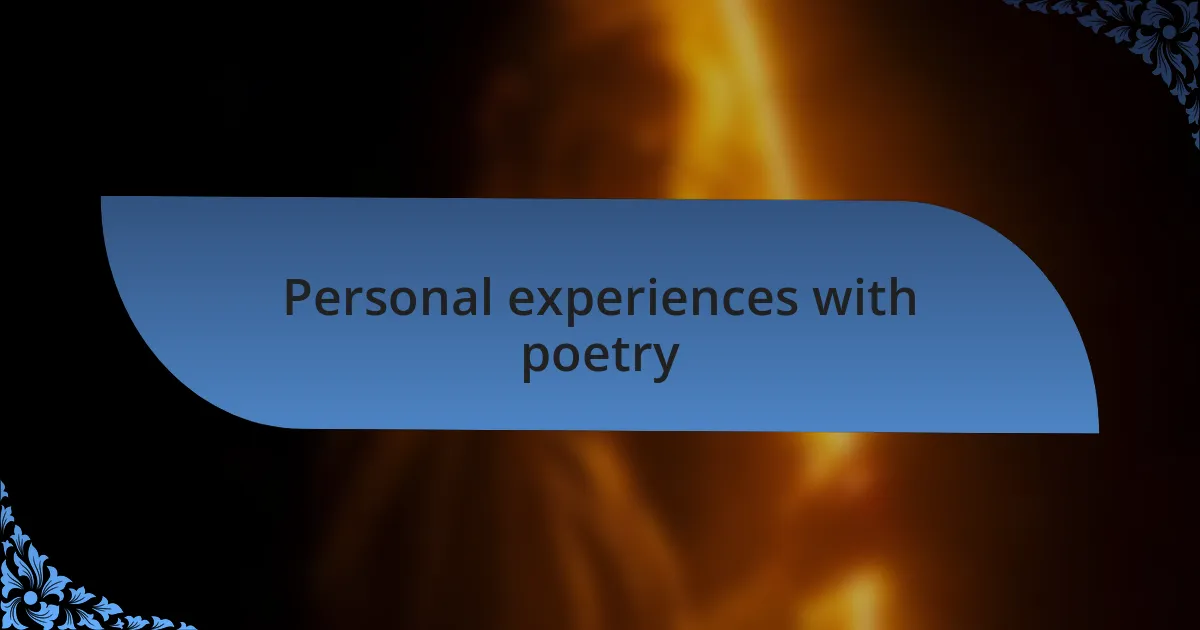
Personal experiences with poetry
Poetry has been a compass during pivotal moments in my life. I recall a time when I felt utterly lost, and stumbling upon a collection of sonnets became a lifeline. Those verses, rich with imagery and emotion, reminded me that I wasn’t alone in feeling adrift; it was as if the poets had penned their own struggles as a way to guide me through mine.
There’s something magical about the rhythm of poetry, isn’t there? I remember attending a spoken word event where a poet shared their journey through mental health challenges. Listening to those raw, rhythmic verses stirred something inside me, rekindling my passion for expression. In that space, I felt an undeniable connection not just to the poet, but also to fellow audience members, as our shared experiences floated in the air.
In my own writing, I often draw inspiration from the emotions I encounter in others’ poetry. After reading a deeply reflective piece about solitude, I found myself compelled to write about my own experiences of isolation, leading to unexpected revelations. This exchange between reading and writing has taught me that poetry is not just a solo journey; it’s a communal exploration of the human experience we can all share and learn from.
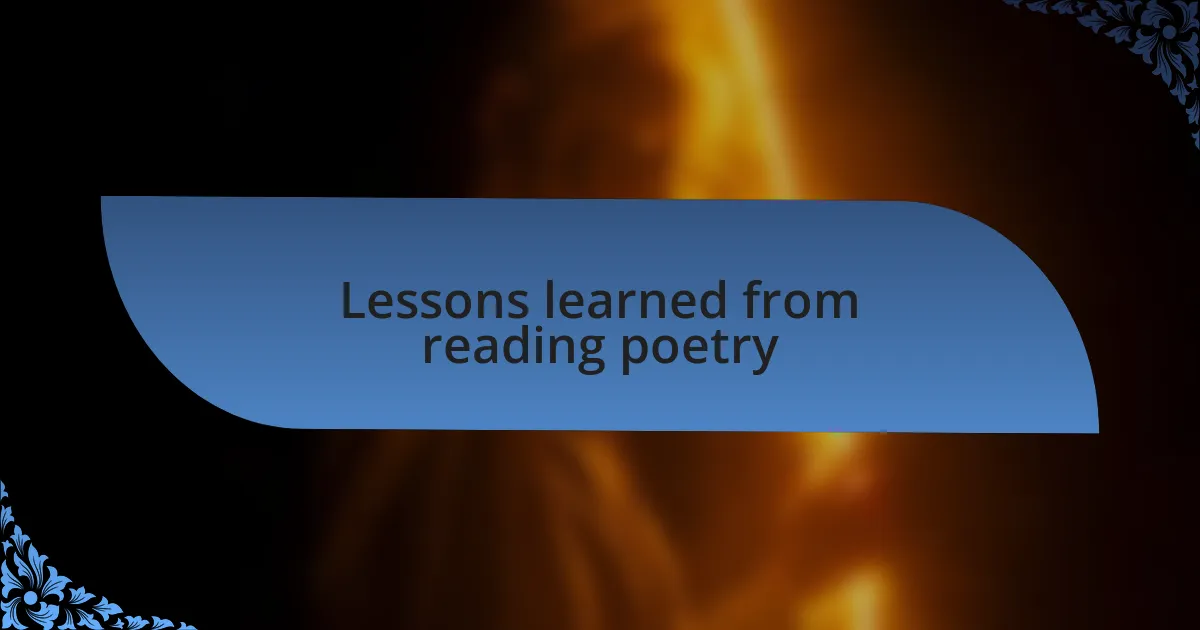
Lessons learned from reading poetry
Reading poetry has taught me the value of vulnerability. I recall one particular poem that laid bare the poet’s insecurities, and it resonated with me deeply. I found myself wondering, why do we shy away from showing our true selves? Embracing that vulnerability made me more open in my own writing, allowing my voice to emerge authentically.
The power of imagery in poetry has also left a lasting impression on me. I remember a line that described the sky as a ‘melting canvas of colors’—it captivated my imagination and forced me to pause. It made me realize how often we overlook the beauty around us in our daily lives. Through poetry, I’ve learned to pay attention, to seek out and cherish those moments of wonder that often go unnoticed.
One of the greatest lessons I’ve gleaned from poetry is the art of brevity. I once read a haiku that encapsulated a season in just three lines, evoking such emotion in me that I felt transported. It made me realize that sometimes, less truly is more. I now strive to communicate my thoughts concisely, understanding that a potent few words can often leave a more profound impact than lengthy explanations.
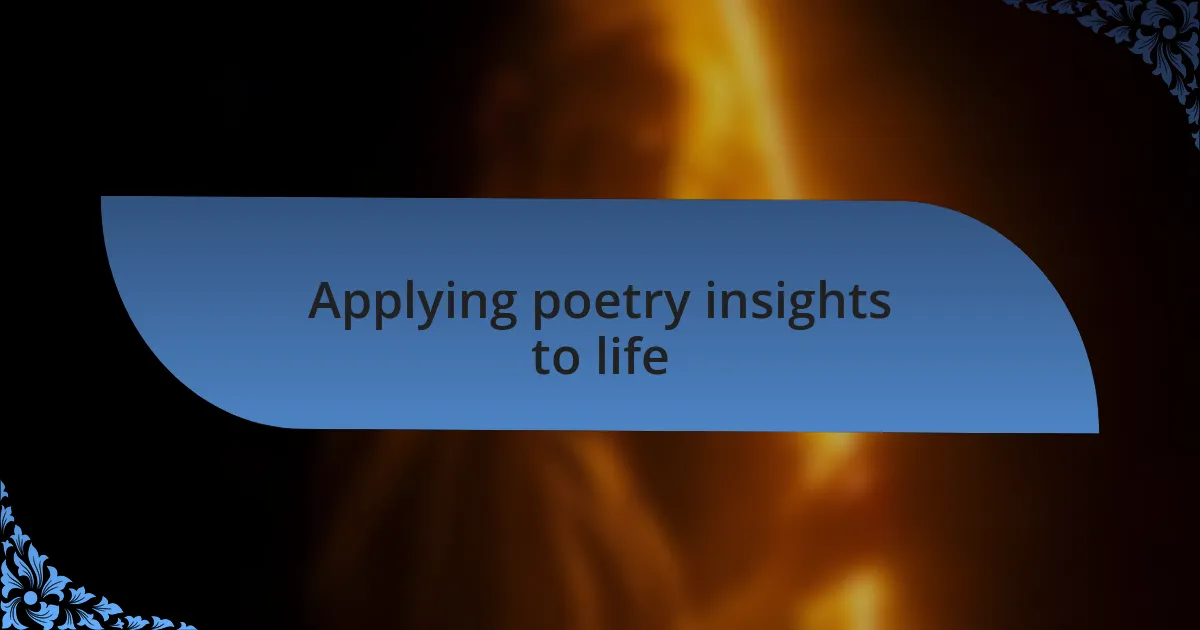
Applying poetry insights to life
Poetry offers a unique lens through which we can view our experiences and emotions. I recall a moment when I found solace in a poem that spoke to heartbreak, articulating feelings I struggled to express. It made me wonder, how can words on a page hold such power to heal? This realization encouraged me to address my own feelings openly, fostering deeper connections both with myself and others.
The exploration of themes like love, loss, and identity in poetry has inspired me to reflect on my personal journey. I remember reading about a poet’s struggle with self-acceptance, and it struck a chord within me. It prompted me to ask, in what ways can I embrace my own complexities? Embracing the lessons conveyed through these verses has allowed me to cultivate a more compassionate relationship with myself, acknowledging that imperfections are part of the human experience.
Moreover, the rhythm and cadence found in poetry have influenced the way I approach daily challenges. I try to find a ‘poetic flow’ in my tasks, even mundane ones. When I face struggles, I often think, how can I transform this experience into something beautiful? This perspective allows me to navigate life’s ups and downs with grace, turning obstacles into opportunities for creativity and growth.
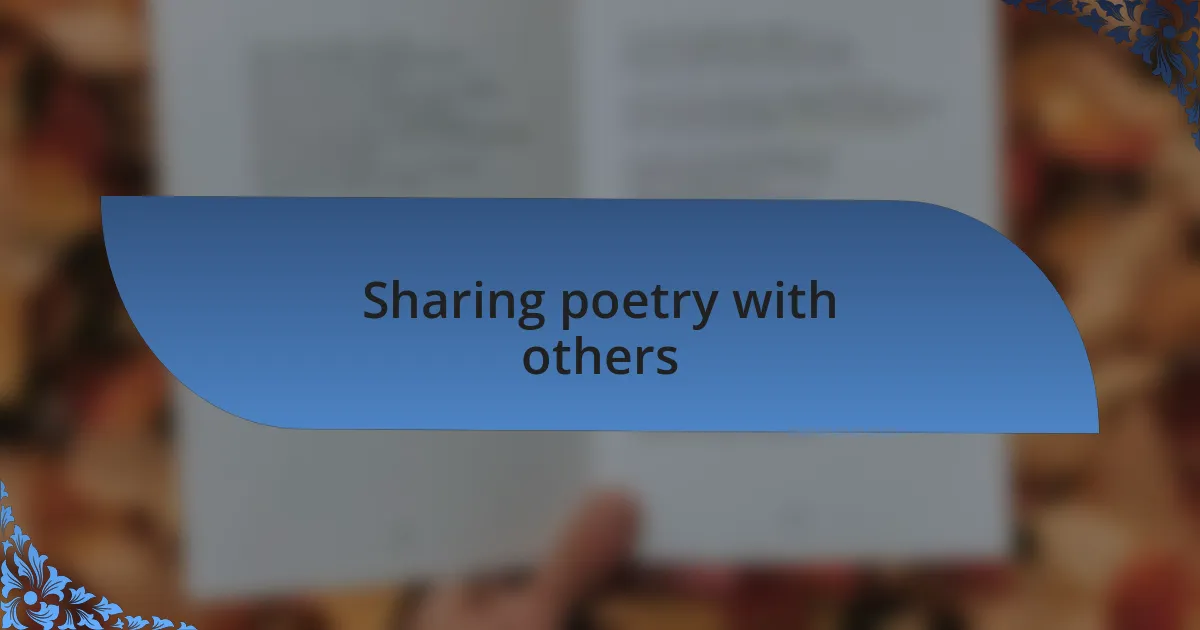
Sharing poetry with others
Sharing poetry creates a bridge between individuals, allowing us to explore our thoughts and feelings together. I remember a book club meeting where we read a poignant poem about grief. Listening to others share their interpretations sparked a genuine exchange that revealed how poetry can mirror our varied experiences, drawing us closer in vulnerability and understanding.
In another instance, I organized a small gathering where friends presented their favorite poems. The atmosphere was electric; with each recitation, laughter and tears intertwined. It struck me that in those moments, we weren’t just sharing lines from a page; we were revealing parts of ourselves. Isn’t it fascinating how a few carefully chosen words can prompt profound discussions and reflections?
Additionally, sharing poetry can often lead us to discover new perspectives. One time, I invited a colleague to write a collaborative piece, opening up a dialogue about our different backgrounds. This experience showed me how sharing poetry expands our horizons and enables us to appreciate the richness of diverse narratives. Have you ever wandered into an unexpected insight simply by sharing your thoughts? That’s the beauty of poetry—it invites connection in the most surprising ways.